2020高中英语语法:介词加关系代词引导的定语从句
“介词+关系代词”引导的定语从句_
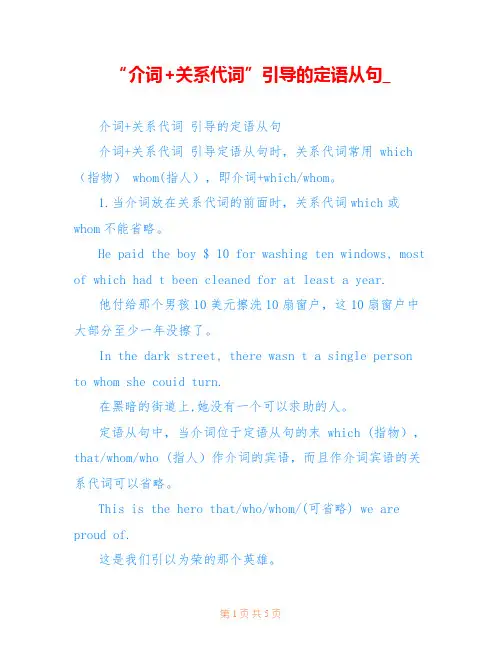
“介词+关系代词”引导的定语从句_介词+关系代词引导的定语从句介词+关系代词引导定语从句时,关系代词常用 which (指物) whom(指人),即介词+which/whom。
1.当介词放在关系代词的前面时,关系代词which或whom不能省略。
He paid the boy $ 10 for washing ten windows, most of which had t been cleaned for at least a year.他付给那个男孩10美元擦洗10扇窗户,这10扇窗户中大部分至少一年没擦了。
In the dark street, there wasn t a single person to whom she couid turn.在黑暗的街道上,她没有一个可以求助的人。
定语从句中,当介词位于定语从句的末 which (指物),that/whom/who (指人)作介词的宾语,而且作介词宾语的关系代词可以省略。
This is the hero that/who/whom/(可省略) we are proud of.这是我们引以为荣的那个英雄。
This is the pen that/which/(可省略) I I wrote the letter with.这是我写信时用的那支钢笔。
【温馨提示】①有些动词+介词的固定词组不可把介词置于关系代词前。
这就是我正在找的磁带。
[误]This is the right tape for which I m looking, [正]This is the right tape that I m looking for.②常见的不可拆开的动词词组有:care for 喜欢,关心deal with 处理,对付get through 通过;到达;接通电话hear from/of 收到某人的来信/听说look for/after寻找/照顾send for派人去请see to照管,料理3.复合介词短语+关系代词which 引导的定语从句,这种结构引导的定语从句常与先行词用逗号分开,定语从句常用倒装语序。
介词加关系代词引导的定语从句
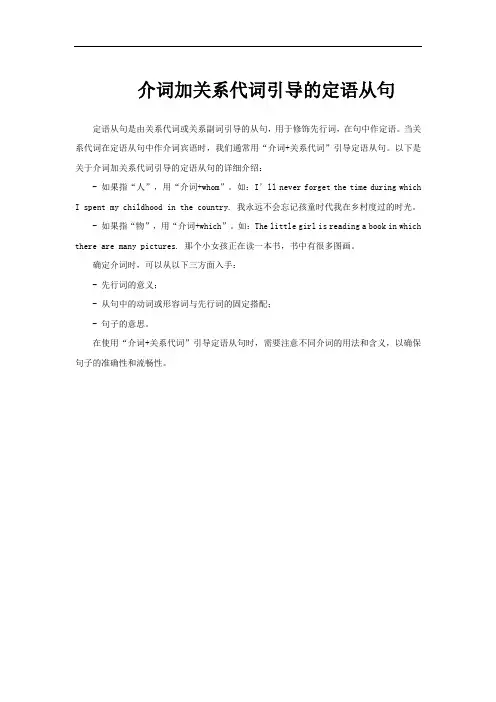
介词加关系代词引导的定语从句
定语从句是由关系代词或关系副词引导的从句,用于修饰先行词,在句中作定语。
当关系代词在定语从句中作介词宾语时,我们通常用“介词+关系代词”引导定语从句。
以下是关于介词加关系代词引导的定语从句的详细介绍:
- 如果指“人”,用“介词+whom”。
如:I’ll never forget the time during which I spent my childhood in the country. 我永远不会忘记孩童时代我在乡村度过的时光。
- 如果指“物”,用“介词+which”。
如:The little girl is reading a book in which there are many pictures. 那个小女孩正在读一本书,书中有很多图画。
确定介词时,可以从以下三方面入手:
- 先行词的意义;
- 从句中的动词或形容词与先行词的固定搭配;
- 句子的意思。
在使用“介词+关系代词”引导定语从句时,需要注意不同介词的用法和含义,以确保句子的准确性和流畅性。
介词加关系代词引导的定语从句
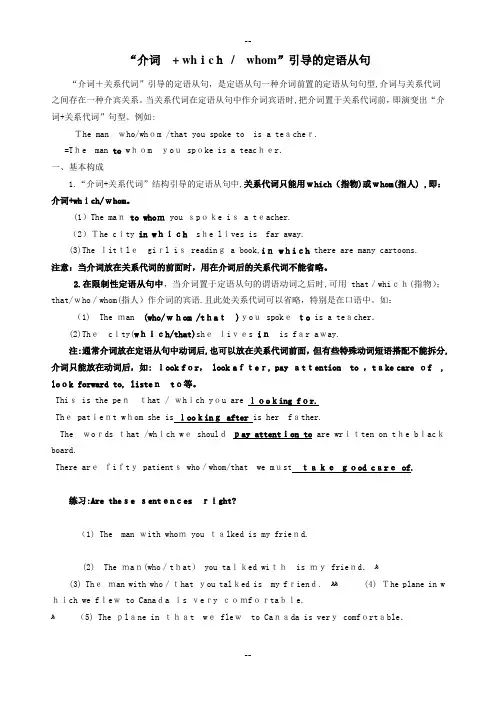
“介词+ which/whom”引导的定语从句“介词+关系代词”引导的定语从句,是定语从句一种介词前置的定语从句句型,介词与关系代词之间存在一种介宾关系。
当关系代词在定语从句中作介词宾语时,把介词置于关系代词前,即演变出“介词+关系代词”句型。
例如:The man who/whom /that you spoke to is a teacher.=The man to whom you spoke is a teacher.一、基本构成1.“介词+关系代词”结构引导的定语从句中,关系代词只能用which(指物)或whom(指人) ,即:介词+which/whom。
(1)The man to whomyou spoke is a teacher.(2)The city in which she lives is far away.(3)The littlegirl is reading a book,in which there are many cartoons.注意:当介词放在关系代词的前面时,用在介词后的关系代词不能省略。
2.在限制性定语从句中,当介词置于定语从句的谓语动词之后时,可用that/which(指物);that/who/whom(指人)作介词的宾语.且此处关系代词可以省略,特别是在口语中。
如:(1) The man (who/whom /that)you spoketo is a teacher.(2)Thecity(which/that)shelives inis far away.注:通常介词放在定语从句中动词后,也可以放在关系代词前面,但有些特殊动词短语搭配不能拆分,介词只能放在动词后,如: look for, look after, pay attention to ,take care of , look forward to, listento等。
This is the penthat / which you are looking for.The patient whom she is looking after is her father.The words that /which we shouldpay attention to are written on the blackboard.There arefifty patients who/whom/that we musttakegood care of.练习:Are these sentences right?(1) The man with whom you talked is my friend.(2) The man(who/that) you talked withis my friend.ﻫ(3) Theman with who/that you talked is my friend. ﻫﻫ(4) The plane in w hich we flew to Canada is very comfortable.ﻫ(5) The plane in that we flew to Canada is very comfortable.二、关系副词when,where,why可用“介词+which”来代替。
高中英语引导定语从句-介词+关系代词结构归纳
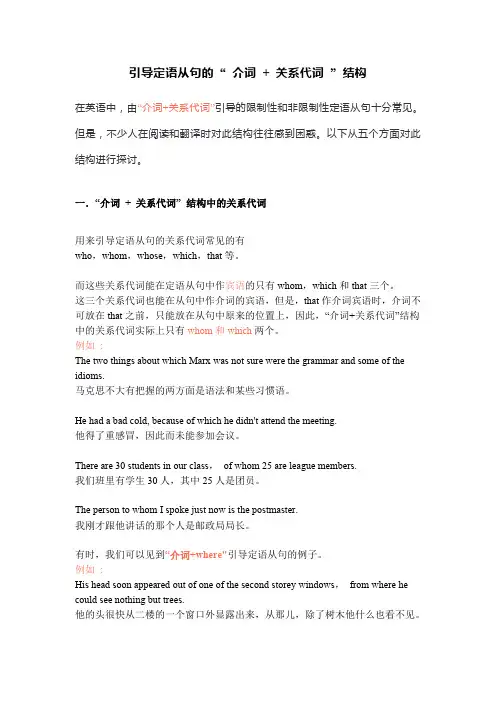
引导定语从句的“ 介词+ 关系代词” 结构在英语中,由“介词+关系代词”引导的限制性和非限制性定语从句十分常见。
但是,不少人在阅读和翻译时对此结构往往感到困惑。
以下从五个方面对此结构进行探讨。
一.“介词+ 关系代词” 结构中的关系代词用来引导定语从句的关系代词常见的有who,whom,whose,which,that等。
而这些关系代词能在定语从句中作宾语的只有whom,which和that三个。
这三个关系代词也能在从句中作介词的宾语,但是,that作介词宾语时,介词不可放在that之前,只能放在从句中原来的位置上,因此,“介词+关系代词”结构中的关系代词实际上只有whom和which两个。
例如:The two things about which Marx was not sure were the grammar and some of the idioms.马克思不大有把握的两方面是语法和某些习惯语。
He had a bad cold, because of which he didn't attend the meeting.他得了重感冒,因此而未能参加会议。
There are 30 students in our class,of whom 25 are league members.我们班里有学生30人,其中25人是团员。
The person to whom I spoke just now is the postmaster.我刚才跟他讲话的那个人是邮政局局长。
有时,我们可以见到“介词+where"引导定语从句的例子。
例如:His head soon appeared out of one of the second storey windows,from where he could see nothing but trees.他的头很快从二楼的一个窗口外显露出来,从那儿,除了树木他什么也看不见。
高中英语引导定语从句-介词+关系代词结构归纳

引导定语从句的“ 介词+ 关系代词” 结构在英语中,由“介词+关系代词”引导的限制性和非限制性定语从句十分常见。
但是,不少人在阅读和翻译时对此结构往往感到困惑。
以下从五个方面对此结构进行探讨。
一.“介词+ 关系代词” 结构中的关系代词用来引导定语从句的关系代词常见的有who,whom,whose,which,that等。
而这些关系代词能在定语从句中作宾语的只有whom,which和that三个。
这三个关系代词也能在从句中作介词的宾语,但是,that作介词宾语时,介词不可放在that之前,只能放在从句中原来的位置上,因此,“介词+关系代词”结构中的关系代词实际上只有whom和which两个。
例如:The two things about which Marx was not sure were the grammar and some of the idioms.马克思不大有把握的两方面是语法和某些习惯语。
He had a bad cold, because of which he didn't attend the meeting.他得了重感冒,因此而未能参加会议。
There are 30 students in our class,of whom 25 are league members.我们班里有学生30人,其中25人是团员。
The person to whom I spoke just now is the postmaster.我刚才跟他讲话的那个人是邮政局局长。
有时,我们可以见到“介词+where"引导定语从句的例子。
例如:His head soon appeared out of one of the second storey windows,from where he could see nothing but trees.他的头很快从二楼的一个窗口外显露出来,从那儿,除了树木他什么也看不见。
定语从句中介词加关系代词的用法
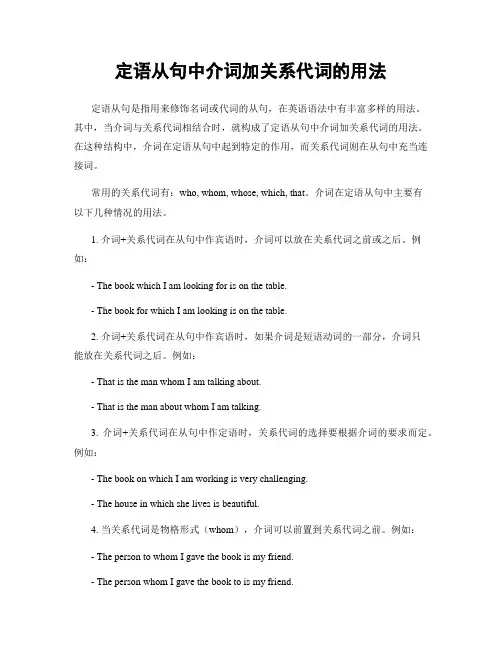
定语从句中介词加关系代词的用法定语从句是指用来修饰名词或代词的从句,在英语语法中有丰富多样的用法。
其中,当介词与关系代词相结合时,就构成了定语从句中介词加关系代词的用法。
在这种结构中,介词在定语从句中起到特定的作用,而关系代词则在从句中充当连接词。
常用的关系代词有:who, whom, whose, which, that。
介词在定语从句中主要有以下几种情况的用法。
1. 介词+关系代词在从句中作宾语时,介词可以放在关系代词之前或之后。
例如:- The book which I am looking for is on the table.- The book for which I am looking is on the table.2. 介词+关系代词在从句中作宾语时,如果介词是短语动词的一部分,介词只能放在关系代词之后。
例如:- That is the man whom I am talking about.- That is the man about whom I am talking.3. 介词+关系代词在从句中作定语时,关系代词的选择要根据介词的要求而定。
例如:- The book on which I am working is very challenging.- The house in which she lives is beautiful.4. 当关系代词是物格形式(whom),介词可以前置到关系代词之前。
例如:- The person to whom I gave the book is my friend.- The person whom I gave the book to is my friend.需要注意的是,在口语中,人们往往更倾向于使用介词后置的形式,即将介词放在关系代词后面。
同时,有时候可以使用介词+which来替代介词+关系代词的结构,这种形式更加简洁。
高中英语语法:介词加关系代词引导的定语从句
高中英语语法“介词+ which / whom”引导的定语从句“介词+关系代词”引导的定语从句,是定语从句一种介词前置的定语从句句型,介词与关系代词之间存在一种介宾关系。
当关系代词在定语从句中作介词宾语时,把介词置于关系代词前,即演变出“介词+关系代词”句型。
例如:The man who/whom /that you spoke to is a teacher.=The man to whom you spoke is a teacher.一、基本构成1.“介词+关系代词”结构引导的定语从句中,关系代词只能用which(指物)或whom(指人) ,即:介词+which/whom。
(1)The man to whom you spoke is a teacher.(2)The city in which she lives is far away.(3)The little girl is reading a book,in which there are many cartoons.注意:当介词放在关系代词的前面时,用在介词后的关系代词不能省略。
2.在限制性定语从句中,当介词置于定语从句的谓语动词之后时,可用that/which(指物);that/who/whom(指人)作介词的宾语.且此处关系代词可以省略,特别是在口语中。
如:(1) The man (who/whom /that )you spoke to is a teacher.(2)The city(which/that)she lives in is far away.注:通常介词放在定语从句中动词后,也可以放在关系代词前面,但有些特殊动词短语搭配不能拆分,介词只能放在动词后,如:look for, look after, pay attention to ,take care of , look forward to, listen to等。
介词+关系代词引导的定语从句例句
介词+关系代词引导的定语从句例句
1. 我刚才和你说的那个人,是我公司的新销售经理。
2. 这是我刚刚买的那本书,书里的故事非常有意思。
3. 我昨天接到一个关于工作的电话,电话的内容让我感到惊讶。
4. 昨天你对我提到的那个地方,我已经去过了。
5. 这是我给你准备的那份礼物,希望你会喜欢。
6. 今天我看到了你问到的那个问题的答案,你可以去看一下。
7. 有些人总是对那些他们见过的人保持怀疑的态度。
8. 这是我们一起去过的那个城市,我很喜欢那里的风景。
9. 我想起了你给我介绍的那个朋友,他真的很有趣。
10. 他一直在追求那个对他有好感的女孩。
2020年高考英语词汇语法专题5:代词易错点解题方法(含答案解析)
专题05 代词易错点解题方法(三)由于代词中的关系代词非常具有特色,所以在此特设专讲。
首先我们要知道关系代词又称定语从句引导词。
定语从句是各类从句学习的重点,也是难点。
同学们在学习中常遇到一些难题,出现一些错误。
引导定语从句的词叫关系词。
关系词有关系代词和关系副词。
关系代词有6个: that, which, who, whom, whose, as.5.关系代词引导的定语从句:1).who 指人,在定语从句中作主语。
Those who want to go to the museum must be at the school gate at 7 tomorrow morning.2). whom 指人,在定语从句中做宾语,常可省略。
Mr Liu is the person ( whom ) you talked about on the bus. 注意:关系代词whom 在口语或非正式文体中常可用who 来代替,也可省略。
The man ( whom / who ) you met just now is my old friend.3)。
which 指物,在定语从句中做主语或宾语,做宾语时常可省略。
Football is a game which is liked by most boys.主语4)。
that 指人时,相当于who 或whom;指物时,相当于which。
在定语从句中作主语或宾语,作宾语时常可省略。
The number of people that / who come to visit this city each year reaches one million.5). whose 通常指人,也可指物,在定语从句中做定语。
I visited a scientist whose name is known all over the country. 注意:指物时,常用下列结构来代替:The classroom whose door is broken will soon be repaired.=The classroom the door of which is broken will soon be repaired.下面我们看例题:改正下列定语从句中的典型错误:1. Is this the pen your father bought it for you?[答案]:去掉it。
定语从句——介词关系代词介词关系代词定语从句
定语从句——介词关系代词介词关系代词定语从句定语从句——介词+关系代词根据表达意思的需要,定语从句有时需要以适当的介词开头。
此时,如果被定语从句所修饰的先行词表示的是除人以外的词,定语从句由“介词,which”引导。
如果被定语从句所修饰的先行词表示的是人,定语从句则要由“介词,whom”引导。
例如: The bag in which there are some books is mine. 里面装有一些书的那只包是我的。
The girl about whom we often talk is coming tomorrow. 我们常谈起的那个女孩明天来。
在使用该类定语从句时,我们要注意以下几点:1. 在“介词+关系代词”引导的定语从句中,介词可以放在关系代词前或从句中有关动词后。
介词放在从句中谓语动词后面时,whom/which可以省略,也可以用that替换,whom还可以用who替换。
例如:Great changes have taken place in the village in which I once lived. 我曾经住过的那个村庄发生了巨大的变化。
(关系代词前)Great changes have taken place in the village (which/that) I once lived in.(动词后,which/that可省略)2. 在一些固定搭配的短语中,若将动词和介词分开,意思就会发生变化,所以该介词只能放在从句中的谓语动词后。
例如:depend on,get along with,look after,look forward to,take part in等。
例如:The boy (whom / who) I’m looking af ter is my neighbor. 我正在照顾的那个男孩是我的邻居。
3. 当先行词是way时,关系代词可以用that或in which,也可以省略。
- 1、下载文档前请自行甄别文档内容的完整性,平台不提供额外的编辑、内容补充、找答案等附加服务。
- 2、"仅部分预览"的文档,不可在线预览部分如存在完整性等问题,可反馈申请退款(可完整预览的文档不适用该条件!)。
- 3、如文档侵犯您的权益,请联系客服反馈,我们会尽快为您处理(人工客服工作时间:9:00-18:30)。
高中英语语法“介词+which/whom”引导的定语从句“介词+关系代词”引导的定语从句,是定语从句一种介词前置的定语从句句型,介词与关系代词之间存在一种介宾关系。
当关系代词在定语从句中作介词宾语时,把介词置于关系代词前,即演变出“介词+关系代词”句型。
例如:The man who/whom/th at you spok e to is a teacher.=The man to whom you spok e is a teacher.一、基本构成1.“介词+关系代词”结构引导的定语从句中,关系代词只能用which(指物)或whom(指人),即:介词+which/whom。
(1)The man to whom you spok e is a teacher.(2)The city in which she lives is far away.(3)The little girl is reading a book,in which there are many cartoons.注意:当介词放在关系代词的前面时,用在介词后的关系代词不能省略。
2.在限制性定语从句中,当介词置于定语从句的谓语动词之后时,可用that/which(指物);that/who/whom(指人)作介词的宾语.且此处关系代词可以省略,特别是在口语中。
如:(1)The man(who/whom/that)you spok e to is a teacher.(2)The city(which/that)she lives in is far away.注:通常介词放在定语从句中动词后,也可以放在关系代词前面,但有些特殊动词短语搭配不能拆分,介词只能放在动词后,如:look for,look after,pay attention to,take care of,look forward to,listen to等。
This is the pen(that/which)you are looking for.The patient(who/whom/that)she is looking after is her father.The words that/which we should pay attention to are written on the blackboard.There are fifty patients who/whom/that we must take good care of.二、关系副词when,where,why可用“介词+which”来代替。
关系副词实际上是介词+先行词。
其中when=表时间的介词(如:in,at,during等)+which;Where=表地点的介词(如:in,at,on,under等)+which;Why=表原因的介词(如:for)+which(1)当先行词表示时间,定语从句中缺少时间状语时,通常用关系副词when引导,此时也可选用表示时间的介词+which来代替关系副词when。
I still remember the day when I came here.(on the day=when=on which)(2)当先行词表示地点,定语从句中缺少地点状语时,通常用关系副词where引导,此时也可选用表示地点的介词+which来代替关系副词where。
This is the h ou se where I lived last year.(in the house=where=in which)(3)当先行词为reason,定语从句中缺少表示原因状语时,通常用关系副词why引导,此时也可以用for which来代替关系副词why。
There are many reasons why people like traveling.(for the reasons=why=for which)三、关系代词前介词选择三原则:一先,二动,三意义(重中之重)1.一先,即根据定语从句中介词与先行词的搭配关系选择。
I never forget the day on which I came to this school.(on the day)2.二动,即根据定语从句中谓语动词与介词的搭配关系选择。
This is the iPad on which I spent3000yuan.(spend money on sth.)3.三意义,即根据定语从句的意义来确定介词。
This is my pair of glasses,without which_I cannot see clearly.例题:用“介词+关系代词”的形式表示1.Do you like the book__________she learned a lot?2.He paid the boy$10for washing ten windows,most______hadn't been cleaned for at least a year.3.The tower_________people can have a good view is on the hill.注意:介词+关系代词1)介词后面的关系代词不能省略。
2)that前不能有介词。
3)某些在从句中充当时间,地点或原因状语的"介词+关系词"结构可以同关系副词when,where和why互换。
四、“介词+关系代词”前还可有some,any,none,all,both,neither,many,most,each,few等代词或者数词。
构成:some,any,none,all,both,neither,many,most,each,few+o f+whom(人)/which(物)He loves his parents deeply,both of whom are very kind to him.他深深地爱着他的父母,他们俩待他都很好。
In the bask et there are quite many apples,some of which have gone bad.篮子里有好些苹果,有些已经坏了。
There are forty students in our class in all,most of whom are from big cities.Up to now,he has written ten stories,three of which are about country life.Here are many books,two of which he borrowed.这儿有许多书,他借走了两本。
I bought him two pieces of clothing,neither of which he likes.我给他买了两件衣服,他一件也不喜欢。
练习:()1.He was ed u cat ed at a local g rammar school,____he went on to Cambridge.A.from whichB.after thatC.after whichD.from this()2.She was e d u cated at Beijing University,______she went on to have her adv anced study abroad.A.after thatB.from thatC.from whichD.after which()3.Gun control is a subject_________Americans have ar g ue d for a long time.A.of whichB.with whichC.about whichD.into which()4.Wind power is an ancient source of energy______we may return in the near future.A.on whichB.by whichC.to whichD.from which()5.The settlement is home to nearly1,000people,many of_____left their village homes for a better life in the city.A.whomB.whichC.themD.whose()6.The English play___my students acted at the New Year’s party was a great success.A for whichB at whichC in whichD on which()7.The journey ar ou n d the world took the old sailor nine months,____the s ailing time was226days.A.of whichB.during whichC.from whichD.for which()8.Many people who had seen the film were afraid to go to the forest when they remembered the scenes ______people were e at en by the tiger.A.in whichB.by whichC.whichD.that()9.She show ed the visitors ar ou nd the museum,the construction_____had tak en more than thr ee years.A.for whichB.with whichC.of whichD.to which()10.The place____the bridge is supposed to be built should be___the cross-river traffic is the heaviest.A.which;whereB.at which;whichC.at which;whereD.which;in which()11.Eric received training in the computer for one year,______he found a job in a big company.A.after thatB.after whichC.after itD.after this()12.Villagers here depend on the fishing industry,________there won't be mu ch work.A.whereB.thatC.by whichD.without which()st week,only two people came to look at the house,________wanted to buy it.A.none of themB.both of themC.none of whomD.neither of whom()14.In the office I never seem to have time until after5:30pm____,many people have gone home.A.whose timeB.thatC.on whichD.by which time()15.Whenever I met her,_______was fairly often,she g r ee t ed me with a sweet smile.A.whoB.whichC.whenD.that()16.She br ou g h t with her three friends,none of______I had ever met before.A.themB.whoC.whomD.these()17.Many children,____parents are away working in big cities,are tak en good care of in the village.A.theirB.whoseC.of themD.with whom()18.I was born in New Orleans,Louisiana,a city________name will create a picture of beautiful trees and gr een grass in our mind.A.WhichB.of whichC.that二、根据句子意思,用“介词+关系代词”填空。
